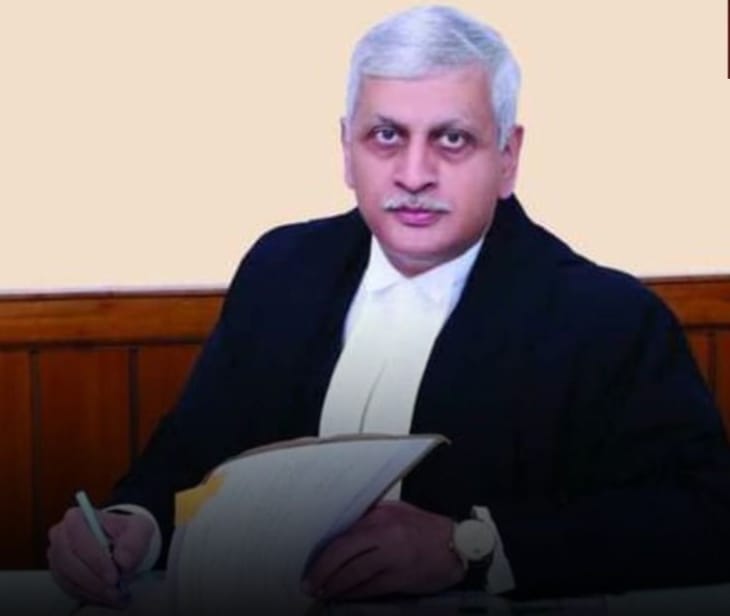
Chief Justice of India N V Ramana (right) with Justice Uday Umesh Lalit during a meeting, in New Delhi, Aug. 4, 2022.
Hon’ble Justice U.U. Lalit will take charge on 27th August 2022, a day after Hon’ble Justice N.V. Ramana demits office as the Chief Justice of India. Justice Lalit will have a brief tenure as he will demit office on November 8 after holding the charge as the CJI for a little under three months.
The CJI’s Secretariat received recommendation from Law and Justice Minister Kiren Rijiju on August 3 requesting him to recommend the name of his successor. The CJI personally handed over a copy of his letter of recommendation to Justice Lalit, next in seniority to Justice Ramana.

Justice Lalit will become the second CJI who was directly elevated to the apex court Bench from the Bar. Justice S M Sikri, who became the 13th CJI in January 1971, was the first lawyer to be elevated directly to the top court bench in March 1964.
Born November 9, 1957, Justice Lalit practised as an advocate in the Bombay High Court from 1983 to 1985 before moving to the national capital, Delhi. He later practiced in the Supreme Court from 1986, with the top court designating him as a senior advocate in 2004.
Lalit’s father, U.R. Lalit, was also a senior advocate and served as additional judge of the Delhi high court. Both father and son built their legal practice primarily in the field of criminal law, and the then-lawyer Lalit was also appointed as amicus curiae under various Supreme Court benches.
Justice Lalit has been involved in a series of important and significant judgments in his tenure as an SC judge.
Triple Talaq: One of the most significant verdicts was the August 2017 judgment by a five-judge constitution bench which by a 3-2 majority ruled the practice of divorce through instant ‘triple talaq’ as “void”, “illegal” and “unconstitutional”. While then Chief Justice J S Khehar and Justice S Abdul Nazeer were in favour of putting on hold the judgment for six months and asking the government to come out with a law to that effect, Justices Kurian Joseph, R F Nariman, and UU Lalit held the practice as violative of the Constitution. Justices Khehar, Joseph, and Nariman have since retired.
Temple management rights: In another important judgment, a bench headed by Justice Lalit had ruled the erstwhile royal family of Travancore has the management right over the historic Sree Padmanabhaswamy Temple in Kerala, one of the richest shrines, holding that the rule of “heritability must get attached to a right of Shebait” (servitor) of the temple.
POCSO verdict: Overturning skin-to-skin POCSO judgment: Another landmark judgment by Justice Lalit was the quashing of a Bombay High Court verdict on a POCSO case in which the judge had ruled that only skin-to-skin contact could be considered sexual assault. A bench headed by Justice Lalit had later ruled that touching sexual parts of a child’s body or any act involving physical contact with ‘sexual intent’ amounts to ‘sexual assault’ under section 7 of the Protection of Children from Sexual Offences (POCSO) Act as the most important ingredient is sexual intent and not skin-to-skin contact.
As a lawyer, Lalit had also appeared as the special prosecutor in the 2G spectrum trial and counsel for actor Salman Khan, who was accused in the blackbuck poaching case. He had also represented Congress leader Navjot Singh Sidhu in a culpable homicide case and former chief minister of Punjab, Amarinder Singh, in a corruption case, among others.
According to the Memorandum of Procedure (MoP), which governs the process of appointment of judges in higher judiciary, the outgoing CJI initiates the process of naming the successor after getting a communication from the Law ministry.
The MoP says the senior-most judge of the apex court is considered fit to hold the office of the CJI and the views of the outgoing head of the judiciary have to be sought "at the appropriate time”.
The MoP, however, does not specify the time limit for the initiation of the process of recommending the name of the successor CJI.
0 Comments:
Leave a Reply